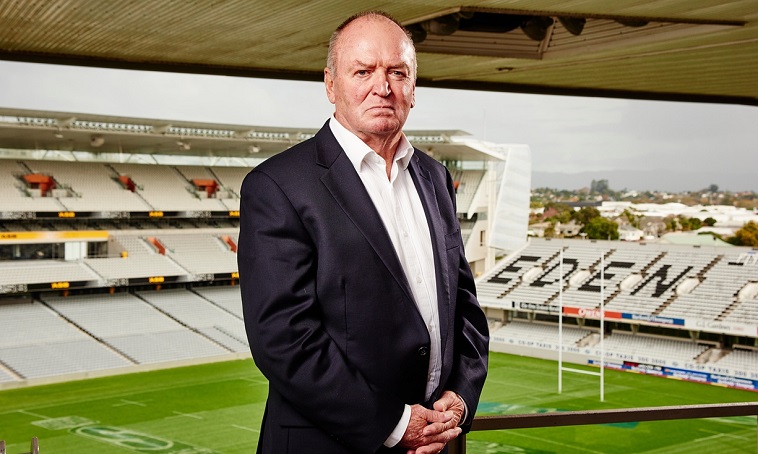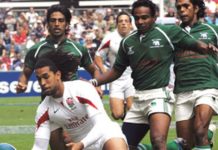Graham Henry looks down at the grass of Eden Park. So many matches, so many memories. One wells up above the others. 23 October, 2011, the World Cup final, New Zealand 8, France 7.
The culmination of a 37-year career that started when Henry took charge of Auckland Grammar’s under-15 team. “When I was coaching the All Blacks I was probably the most experienced coach in the world,” Henry says. “That’s not an arrogant statement, it’s a fact.”
Henry moved from school coach to province coach to Super Rugby coach. Then there was Wales. They lost in the World Cup quarter-finals in 1999. That was followed by a poor tour with the British & Irish Lions in 2001 that ended in a 2-1 defeat by Australia. Another spell with Auckland, in rugby rehab. Then, at last, the top job. Head coach of the All Blacks. In 2007, came the hardest defeat of all, another quarter-final defeat, by France in Cardiff. For Henry, it was a long road to the 2011 final. These are the pick of the many lessons he learned along the way.
Culture comes first
Henry took on the All Blacks job in December 2003, but he did not really take charge for another 12 months. After New Zealand’s defeat by South Africa at Ellis Park in August 2004, the team held a mock court session. Two senior players, Justin Marshall and Carlos Spencer, passed down the punishments. Mostly they involved downing alcohol. Almost everyone ended up blind drunk. Henry realised then the squad had become dysfunctional. Back in New Zealand, Henry and his assistants, Steve Hansen and Wayne Smith, met two senior players. It was the most important meeting Henry had in his eight years in charge. “We agreed we had to move away from that macho culture.”
They drafted a three-point manifesto. You can boil it down to one: “You’re an All Black 24/7”. No more mock courts. No more binge drinking. No women in the team hotel. It was during this meeting the All Black manager, Sir Brian Lochore, coined what would become a mantra for Henry and his team: “Better people make better All Blacks”. This is something Henry singles out about Stuart Lancaster. “Stuart understands the importance of standards and culture, how that transfers on to the field and how, if you get them right, that results in the team connecting with each other.”
In 2004, Henry dropped Spencer and Marshall from the All Blacks’ next tour, though they had 112 caps between them. Spencer never played for his country again. Now, Henry says Lancaster’s decision to drop Manu Tuilagi after he was convicted of assault this year was a masterstroke, because “it will tighten up the group, and they will play better for it”.
Check your ego
“I went through a big learning curve with Wales and then the British and Irish Lions in 2001,” Henry says. “I was arrogant, just so up myself. And it killed me. I’m still alive but it killed me. I realised then that I had to change. I couldn’t carry on being the authoritarian coach and telling people what to do.”
In 2005, Henry was approached by the All Black captain, Tana Umaga. “Coffee, Ted?” he said. “Alright, T,” Henry replied, thinking to himself ‘What’s going on here?’ After a while, Umaga asked: “Ted, what do you give those team talks for?” Henry thought about it. “Well, T, I thought they might provide the team with a bit of motivation, a bit of direction, before the match.” Umaga paused. “Ah, but are they for you, Ted, or are they for us?”
The team talk had been part of Henry’s ritual for 30 years. He liked to think he was pretty good at it but he realised Umaga was right. “You spend the week before each game building the momentum of the group. As you do that, you transfer the responsibility from the coaches to the players but then an hour before the game, there is a fella up the front telling them what to do. I realised it just didn’t fit.”
He never gave another team talk.
Empower your players
After Henry left Wales, in 2002, he took a job as the assistant coach at the Auckland Blues. It was there, while working as part of a coaching team, he realised what he needed to change. “I had to empower the players, I had to give them more responsibility.” Until then, Henry had been an autocrat. Over the course of his eight years with the All Blacks he passed more and more of his power to his players.
The coaches identified a group of seven senior players who they wanted to take ownership of the team. They were a mixed bunch. Richie McCaw, Dan Carter, Andrew Hore, and Mils Muliaina were the on-field leaders – they would help plan match tactics and training schedules. Conrad Smith, Brad Thorn, and Keven Mealamu were the off-field leaders – they were responsible for the social schedule and for helping ease new players into the team.
“Everything was discussed among the team before it was set in concrete, because the more empowered players are, the better they play,” Henry says, The group of seven set the objectives, strategies and rules. In 2015, when Cory Jane and Israel Dagg went out on a drinking binge three days before the quarter-final it wasn’t Henry they had to answer to but their own team-mates. “That was much more powerful than anything I could have said because I was old enough to have been their grandfather.”
During the last 30 minutes of the final, France were one point behind and pressing hard. Henry and Smith passed a message to the pitch through Hansen. “Kick deep for position. Get the ball in behind them. Play the game in the French 22.” The players ignored it. “Richie thought it was a better idea to keep the ball and grind it out because he was worried that a kick would spark a strong counterattack. “We couldn’t understand why our instructions were being ignored but Richie was right.”
Be smart, be secretive
“Part of the enjoyment of coaching rugby is that you’re always trying to find a little thing that will make a difference,” Henry says. “Something that is just going to give you a small edge.”
In 2008, Hansen concocted just such a move. It was called “Teabag”, after the loosehead prop, Tony Woodcock. At an attacking lineout the hooker threw to the lock. While he was in the air, half the lineout men moved forward and half moved back, opening up a cavernous gap. Then the lock passed the ball down to Woodcock who sauntered straight through the middle. The team used it once, when they beat Australia in Auckland that August. “We’ll put that one on ice,” Hansen said. “Teabag” wasn’t seen again for another three years, until McCaw decided to call on it 15 minutes into the World Cup final. Woodcock ran through the gap again to score New Zealand’s only try of the match.
Confront your weaknesses
Two of Henry’s three predecessors lost their jobs immediately after the All Blacks were knocked out of the World Cup. He was able to keep his only because he understood what went wrong when his team lost in 2007 and was able to convince the NZRU he had a fix for it. Henry was appalled by the poor refereeing in the match but he knew, too, that his team had failed to adjust to the situation. That they had, as the media put it, choked.
“Psychology is a difficult area. People sort of avoid it because they don’t know anything about it,” Henry says. “But after you’ve been through that situation, and found you couldn’t handle the pressure, then you have to dive into it, dissect it and get expertise in to assist with it.” They hired Ceri Evans, a Rhodes scholar who won 56 caps for New Zealand’s football team and a highly qualified psychologist.
“We educated ourselves about how the mind functions when it working well and how it functions when it is under pressure. Just to understand the difference between those two things is very helpful.” Then they tried to help each individual develop the skills to “stay positive and stay in the now”. He won’t let on too much because New Zealand are still using the same techniques. “But you do see the All Blacks win matches they probably shouldn’t, because the players have got the mental skills now to know that the game is not over until 80 minutes. They don’t panic if they’re behind on the scoreboard.”
Expect the unexpected
If you can be sure of anything in a tournament as long and gruelling as the World Cup it’s that there are going to be some twists and turns along the way. In 2007, Henry and his team were caught short by poor refereeing and an inspired France. In the run-up to 2011, he decided to try to prepare plans for all the worst-case scenarios he and his leadership team could imagine. “Unexpected situations. McCaw breaks his leg in the first minute of the final, what happens then? How do you handle that? You have to look at all the possibilities. Our philosophy was ‘the unexpected is going to happen, so try and handle it.’”
In 2010-11, Henry had been heavily criticised for rotating his players. They said he was devaluing the All Black New Zealand caps by giving them away so easily. But it meant that a player such as Stephen Donald, the fourth-choice fly-half, had 22 caps. “If he hadn’t had that All Black experience, he wouldn’t have been able to do what he did in the World Cup final.”
It paid off. Carter, “probably the most influential player in the world at the time”, tore a groin tendon during training. They had a plan for that. Colin Slade stepped up and Aaron Cruden came into the team. Then Slade got injured playing against Argentina. They had a plan for that. Scrum-half Piri Weepu took on the goal-kicking. In the final, Slade went off injured. So on came Donald. “It didn’t make it easy, but thank God we had the strategy to deal with it. We could say: ‘We’ve planned for this, so let’s do the business on that plan.’”






















